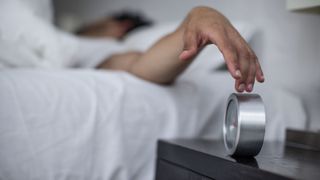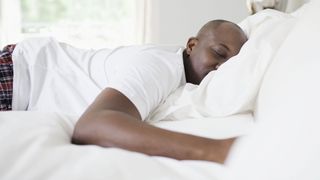World Sleep Day: study links depression with bad sleep habits
We all know that a bad night’s sleep can ruin your mood the next day and that, conversely, a good eight hours of restful slumber can make you feel unbeatable. But how strong is the connection between sleep and mental health? A new poll from the National Sleep Foundation (NSF) has been looking into just that, and the results are pretty clear: there’s a strong correlation between poor sleep and depression.
The NSF’s annual Sleep in America poll (opens in new tab) has been running for 25 years, making it one of the longest-running records of U.S. perceptions, attitudes, and trends in sleep health. With organizations including the CDC and National Institutes of Health (NIH) recognizing mental health as a critical issue right now, this year the NSF felt the need to explore the connection between sleep health and mental health conditions like depression.
The headline numbers make a strong case: the poll found that 65% of adults who are dissatisfied with their sleep also experience mild or greater levels of depressive symptoms, while half of adults who get less than the NSF-recommended 7-9 hours of sleep every night similarly experience mild or stronger depressive symptoms.
Looking more closely at the figures, the poll reports that adults who slept less than seven hours per night on weekdays were three times more likely to experience moderate to severe depressive symptoms than people who got the recommended seven to nine hours’ sleep.
And it isn’t just poor sleep every night that can have an impact on your mental wellbeing; the study also found that people who have trouble falling or staying asleep for just two nights a week tend to have higher levels of depressive symptoms than people without sleep difficulties.
On the plus side, however, the NSF’s poll also reveals that over 90% of adults with high levels of healthy sleep behavior report both good sleep health and no significant depressive symptoms. And in all, the poll reports a strong association between healthy sleep behaviors and good mental health, suggesting that as sleep-promoting behaviors increased, levels of depressive symptoms decreased.
Now, it feels reasonable to point out here that correlation is not the same thing as causation; many factors other than sleep can have an impact on mental health, and it may be just as reasonable to suggest that mental health issues can be a cause of poor sleep; our guide to better sleep when you’re feeling anxious is a good starting place if you suspect that anxiety is causing insomnia.
But that said, if fixing your sleep habits has the potential to reduce the chances of depression and improve your mental health in general, it’s something worth pursuing. So what can you start doing now to get better sleep?
How to change up your sleep habits
Fortunately there are plenty of options. Starting with the sleep basics, often the most straightforward reason for poor quality slumber is the bed that you’re sleeping (or failing to sleep) in. By investing in the best mattress for your sleep style, along with a set of the best pillows, you can make an instant difference to your quality of sleep and it might not cost you as much as you’d expect, especially if you take advantage of regular mattress sales.
But if your bed’s not the problem there’s still plenty you can do to improve your sleep. For Sleep Week 2023 we’ve gathered together a selection of the best sleep tips and explainers, covering everything from straightforward hacks to help you fall asleep quicker and enjoy more restful sleep, through to more general sleep advice and tips on using sleep trackers and other devices to give your sleep a technological boost.
Be your best slept self
For an easy-to-remember way to get your house in order, sleep-wise, the NSF’s Best Slept Self initiative is a great starting point. It comprises six steps – three to use in the daytime, and three to use at night – that together can help you be your best slept self:
- Light: ensure that you spend time in bright light during the day.
- Exercise: try to exercise regularly, ideally for 30 minutes a day, five days a week.
- Mealtimes: have your meals at consistent times every day.
- Avoid: Stay away from caffeine, alcohol and heavy meals before bedtime.
- Wind-down: have a consistent, relaxing wind-down routine before you go to bed.
- Environment: put your devices down an hour before bed, and sleep in a dark, quiet and cool environment.
This article is part of TechRadar’s Sleep Week 2023 celebration (running until Saturday 19 March), a week-long look at all things slumber. We’ll be bringing you proven techniques and tips to help you sleep better, and have rounded-up all the top-rated tech to transform your sleep.



